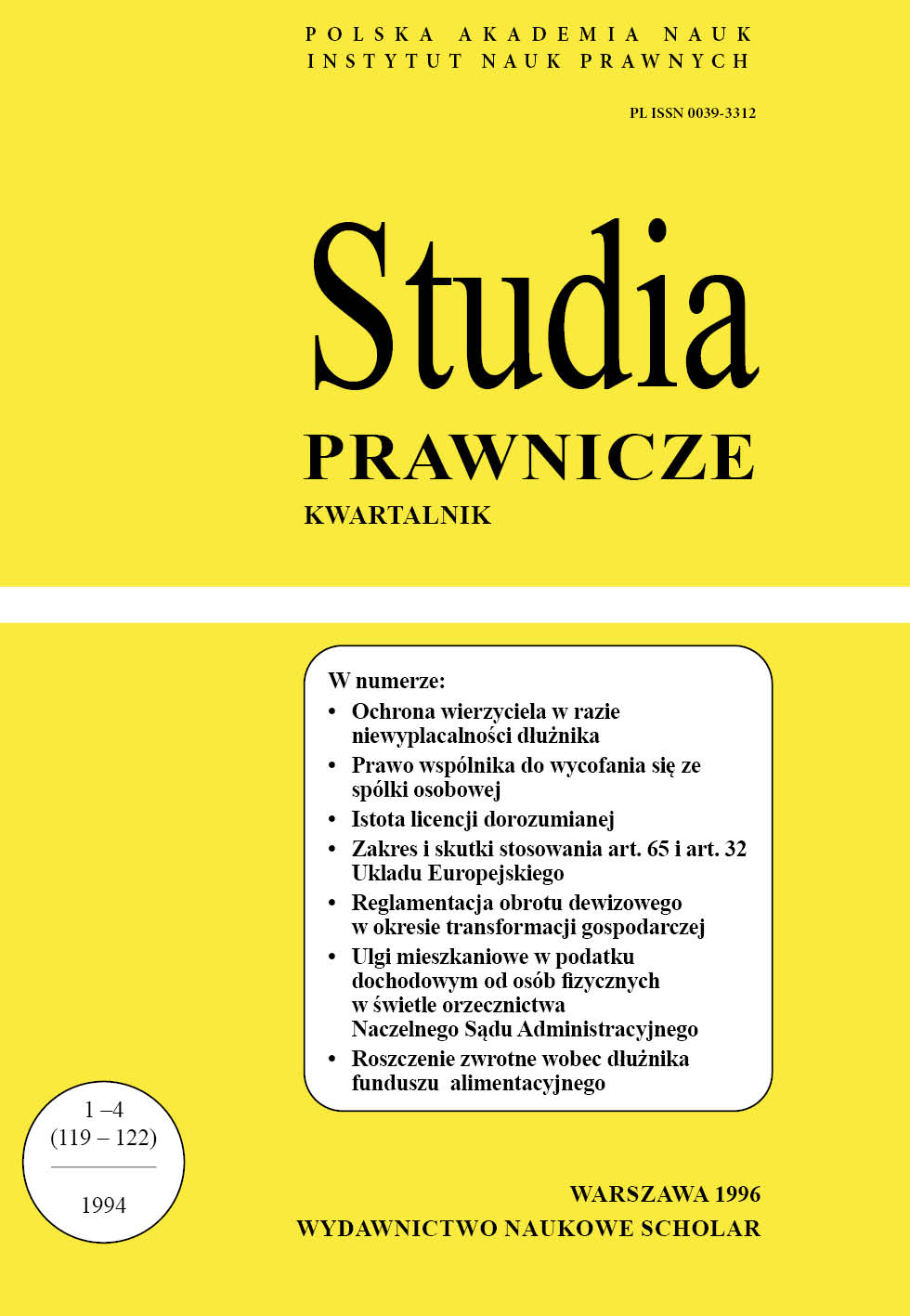Ochrona wierzyciela w razie niewypłacalności dłużnika
Protection of the creditor in the event of the debtor's insolvency
Author(s): Małgorzata Pyziak-SzafnickaSubject(s): Law, Constitution, Jurisprudence
Published by: Instytut Nauk Prawnych PAN
Keywords: insolvency; debtor; Paulian claim; creditor; legal protection
Summary/Abstract: Insolvency within the meaning of Article 527 of the Civil Code means a state of a debtor's assets, in which enforcement carried out in accordance with the provisions of the Code of Civil Proceedings cannot result in the satisfaction of a monetary claim due from that debtor. The lack of sanity, a minimum awareness, excludes the option that the debtor could have acted with the conscious intent of harming the creditors. When the debtor is a legal person, the legal act is performed by a body according to the body theory adopted in our legislation (Article 38 of the Civil Code). The assessment of subjective state, including awareness or the intention to cause harm, is related to an individual who is a body. When the action is performed by an attorney, the fulfilment of the subjective prerequisite on the side of the principal or his/her attorney is sufficient for a charge covered under Article 527 of the Civil Code. Even a proof provided by a third party and indicating that it did not know and - despite exercising the utmost diligence - could not have known of the harm to creditors, does not relieve it of its liability towards the creditor. The subjective status of the third party is simply neutral here, a charge requires only that the other conditions of Article 527 § 1 i § 2 of the Civil Code are met. The rebuttability of the presumption provided for in Article 529 of the Civil Code means that, even in the case of a donation, the debtor can effectively defend against the act being declared as ineffective. The debtor rebuts the presumption by a simple, contrary proof showing that - despite the existence of the basis for the presumption, i.e. the act of the donation resulting in insolvency - it was not aware of the harm to its creditors. This may be the case, in particular, if an event beyond the debtor's control and depriving it of its assets has coincided with the act of the donation. It is not necessary for the court to create an obligation of a third party referred to in Article 531 of the Civil Code. A declaration of the court rendering the act ineffective is adequate. Then, according to the Act, the obligations set out by the Code arise on the side of the third party. It is therefore superfluous to make additional requests in the petition asking the act is declared ineffective, in particular to oblige a third party to waive the enforcement. A Paulian verdict can never decide about a debt of a debtor towards its creditor. Let us remember that a petition made according to Article 527 of the Civil Code is available even to a creditor whose claim is not yet due. However, it is not possible for a creditor to carry out enforcement against the assets of a third party without having the power to make an enforcement against the debtor's own assets. Thus, if a Paulian petition was made by a creditor who did not yet have a writ of execution against the debtor, the creditor will have to enter a proceeding against the debtor despite having obtained a judgement based on Article 527 ff. of the Civil Code. The separate nature of Paulian action according to Article 1024 of the Civil Code, together with general rules expressed in Articles 527-534 of the Civil Code, can be reduced to: 1) elimination of challenges raised by future creditors. An action may be brought forward by “any creditor, whose claim existed at the time the estate was rejected”; 2) a different determination of the time limit for challenging. The 6-month time limit is calculated from the moment the information about the rejection of the estate is obtained, the 3-year time limit runs from the moment this act takes place. By introducing Article 59 of the Civil Code to the Code, the Polish legislator relieved the judges from an extending interpretation of regulations related to the Paulian action. It can and should only come into play when monetary claims should be protected. Article 59 of the Civil Code should be applied in situations, in which the debtor consciously causes a situation, in which a specific claim cannot be satisfied. The sanction of absolute nullity referred to in Article 83 of the Civil Code precedes, as it were, and also consummates the sanction of relative ineffectiveness provided for in Article 527 § 1 of the Civil Code. Absolute nullity, the most serious of the sanctions for defective legal acts, has been conceived in the general interest. In the case of apparent acts made with the purpose of causing damage to the creditors, the application of this sanction by the court means that the verdict is going to be beneficial not only for the claimant. The object of the apparent sale agreement will be subject to execution for the satisfaction of all creditors. A Paulian action may also be used in the case of a transaction, the object of which is the entire enterprise. The fundamental differences concern the formation of the circumstances and the nature of liability. The creditor may invoke Article 526 of the Civil Code even though the debtor - disposing of the enterprise - remains solvent. This regulation also functions in abstraction from the subjective state of the debtor. The means of protecting the creditor's interest here is the classic mechanism of bond law - debt accession. The purchaser of the enterprise is jointly and severally liable with the seller - the debtor.
Journal: Studia Prawnicze
- Issue Year: 1994
- Issue No: 1-4
- Page Range: 5-56
- Page Count: 52
- Language: Polish

